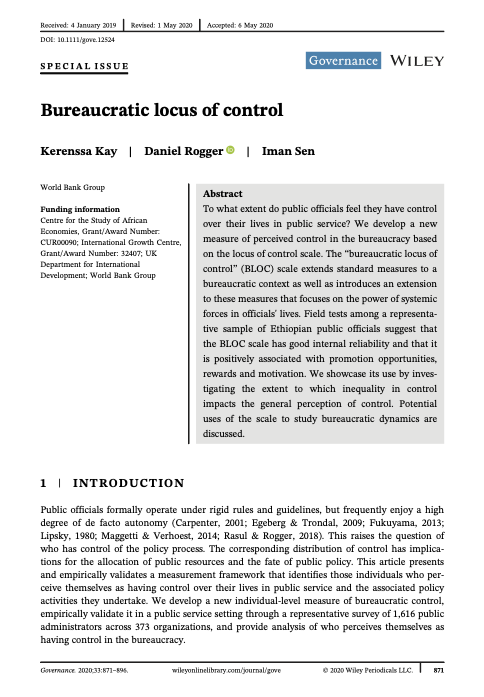Reproducibility package for Bureaucratic locus of control
2020
Overview
To what extent do public officials feel they have control over their lives in public service? We develop a new measure of perceived control in the bureaucracy based on the locus of control scale. The “bureaucratic locus of control” (BLOC) scale extends standard measures to a bureaucratic context as well as introduces an extension to these measures that focuses on the power of systemic forces in officials' lives. Field tests among a representative sample of Ethiopian public officials suggest that the BLOC scale has good internal reliability and that it is positively associated with promotion opportunities, rewards and motivation. We showcase its use by investigating the extent to which inequality in control impacts the general perception of control. Potential uses of the scale to study bureaucratic dynamics are discussed.
Reproducibility Package
| Repository name | URI |
|---|---|
| Github | https://github.com/worldbank/ethiopia-bloc |
Reproducibility
A readme file with detailed instructions is part of the reproducibility package.
Data
The Ethiopian Civil Servants Survey (ECSS) was undertaken by the World Bank’s Bureaucracy Lab between June and September 2016. The survey included professional level staff and directors or heads of federal ministries or agencies, regional bureaus, and woreda (district) offices. It was undertaken in close collaboration with the Ministry of Public Service and Human Resource Development (now the Civil Service Commission). To protect the anonymity of Civil Servants in Ethiopia, we have not included any individual level characteristics of civil servants. However, some aggregated characteristics at the organization level have been included. The public data only includes variables that are used in the analysis of the Bureaucratic Locus of Control, and to show the relationship with outcomes such as performance and motivation.
Yes, please refer to the data statement and the readme file.
Description
| Author | Affiliation | |
|---|---|---|
| Kerenssa Kay | World Bank | |
| Daniel Rogger | World Bank | drogger@worldbank.org |
| Iman Sen | World Bank |
We thank the Ministry of Public Service and Human Resource Development of the Federal Government of Ethiopia for their leadership and support throughout design, implementation and data collection. We are very grateful to Elsa Araya and Verena Fritz of the World Bank's Governance Global Practice and Ravi Somani of the World Bank's Development Impact Evaluation Research Group for collaboration on implementation of the survey that underlines this work. We are grateful to Anthony Bertelli, Daniel Honig, Kali Trzesniewski, and three anonymous reviewers for valuable comments.
2020-05
Scope and coverage
| Location | Code |
|---|---|
| Ethiopia | ETH |
Disclaimer
The materials in the reproducibility packages are distributed as they were prepared by the staff of the International Bank for Reconstruction and Development/the World Bank. The findings, interpretations, and conclusions expressed in this event do not necessarily reflect the views of the World Bank, the Executive Directors of the World Bank, or the governments they represent. The World Bank does not guarantee the accuracy of the materials included in the reproducibility package.
Access and rights
| Name | URI |
|---|---|
| Modified BSD3 | https://opensource.org/license/bsd-3-clause/ |
Information on metadata
| Name | Abbreviation | Affiliation |
|---|---|---|
| Krestel | CK | World Bank |
2023-07-07
1
